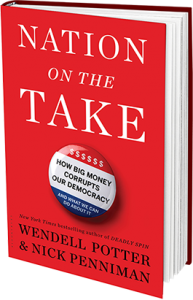While the 2016 presidential election has breached the $1 billion spending mark, less has been made of another, more damaging, part of our out-of-control campaign finance system: congressional “hard money” fundraising. The excerpt below, from the recently released book Nation On The Take, takes a deep dive on “dialing for dollars”—the activity that turns Members of Congress into glorified telemarketers in an endless search for campaign cash.
Nation On The Take: D.C.’s Sweatshops
By Wendell Potter and Nick Penniman
 Not too far from the Capitol Hill townhouses are the call centers that both Democrats and Republicans use to dial for dollars. Endlessly.
Not too far from the Capitol Hill townhouses are the call centers that both Democrats and Republicans use to dial for dollars. Endlessly.
This is how Senator Dick Durbin, Democrat of Illinois, described it: “We sit at these desks with stacks of names in front of us and short bios and histories of giving … and we make calls to our faithful friends and ask them to give money or host a fundraiser.”
National Public Radio tried to get access to the call centers for a story on fundraising in 2012 but got no further than a description of them from members of Congress.
Former representative Dennis Cardoza, a California Democrat, compared his party’s call center to a sweatshop with thirty-inch-wide cubicles set up for the sole purpose of begging for money. He said the need for constant fundraising helped push him into retirement.
Peter DeFazio, a Democrat from Oregon, told NPR, “If you walked in there, you would say, ‘Boy, this is about the worst looking, most abusive looking call center situation I’ve seen in my life.’ These people don’t have any workspace, the other person is virtually touching them.”
Members of both parties say the time they have to spend in the cramped call centers is humiliating. Representative John Larson, Democrat of Connecticut, likened it to “putting bamboo shoots under my fingernails.” One female member of the House told us that, probably because she’s a woman, when she makes her fundraising phone calls the donors are much more casual with her than she would expect—or hope. She recounted a call she made to a Hollywood mogul’s home. The wife answered the phone. After the congresswoman introduced herself, “The wife launched into a tirade about some new curtains that had just arrived at her house, which were the wrong color of yellow. I had to sit and politely, sympathetically, listen to her so that I could get to the point of asking her for a twenty-five-hundred-dollar contribution to my campaign.”
How much time do our elected representatives spend trying to collect money from wealthy people? Roughly 50 percent. One former congressman, Tom Perriello (D-VA), told reporter Ryan Grim at the Huffington Post that even that may be “low-balling the figure so as not to scare the new members too much.”
This feverish fundraising begins even before a freshman gets sworn in. After former representative Walt Minnick, a conservative Democrat from Iowa, won his first election to Congress in 2008, he took just five days off before heading back to the phones. He needed to raise $10,000 to $15,000 a day because his district is considered competitive and he knew he would face a tough reelection. Many freshman members get right to the townhouse circuit before they even more into a Washington apartment.
The constant need for campaign cash not only greases the wheels in Congress for the well-financed special interests but also reduces the amount of time our legislators spend considering or crafting legislation.
Dan Glickman (D-KS) has seen it all, from all angles. He served in the House for eighteen years, representing the people of Wichita, Kansas, then headed the Department of Agriculture for six years, during Bill Clinton’s presidency, then became head of the Motion Picture Association of America, Hollywood’s lobbying and advocacy arm in D.C. According to Glickman,
“The sad truth is that given the frenetic search for money in federal congressional elections, there simply isn’t enough time in the day to stay competitive in campaign finance and do the actual job of policy making…I remember when I was first elected to Congress, I and many other House members would often go down to the floor of the House of Representatives and just listen to the debate. I may not have had an amendment to the bill or a particular interest in the issue but I always felt that watching policy discussions and witnessing the crafting of laws was an important part of my day. It gave me the chance to educate myself and interact with members of Congress on both sides of the aisle. Today most lawmakers would tell you that any free moment not used raising dollars is time wasted.”
This theme of members of Congress not being able to commit time to doing the increasingly complicated job of examining then deeply understanding legislation comes up over and over again. It’s not just driving them nuts, it’s also driving many of them out of office, and it’s deterring good people from even thinking about running.
Senator George Voinovich, an Ohio Republican, left the U.S. Senate in 2010. At the press conference announcing his retirement, he said that it would be impossible to be an effective legislator while also meeting the fundraising demands of running for another term. “You can’t do both of them,” he said. “You’re either going to do the job or you’re going to be out there raising money.”
Of course, not all the fundraising occurs in dreary call center cubicles and trade-association-owned townhouses in D.C. As the New York Times investigative reporter Eric Lipton chronicles in 2014, “destination events” have become all the rage. Republicans join lobbyists and business executives for spa weekends in Las Vegas and ski trips at the Four Seasons resort in Vail. Democrats join lobbyists and business executives on the Ritz-Carlton’s private beach in Puerto Rico and on quail hunts in Georgia.
Such trips are often sponsored by political campaigns or political action committees, which are funded, in part, by…you guessed it: the lobbyists or corporate executives who are attending the festivities, and who have business interests they think the members of Congress might be able to help them with.
As Lipton reported, among those attending a Vail event in January of 2014 were:
Representative Edward Whitfield, Republican of Kentucky, and Katie Ott, a lobbyist for PPL Corporation, the single biggest contributor to Mr. Whitfield.
Mr. Whitfield is chairman of the Energy and Commerce subcommittee that regulates energy utilities, making him one of the most important players in Congress for the industry. Only days after the Vail trip, he introduced legislation that would allow utilities like PPL to build new coal-burning power plants, overriding environmental restrictions recently imposed by the Obama administration.
© Wendell Potter and Nick Penniman, 2016. Extracted from Nation on the Take (How Big Money Corrupts Our Democracy and What We Can Do About It), published by Bloomsbury. Click here to order your copy.




